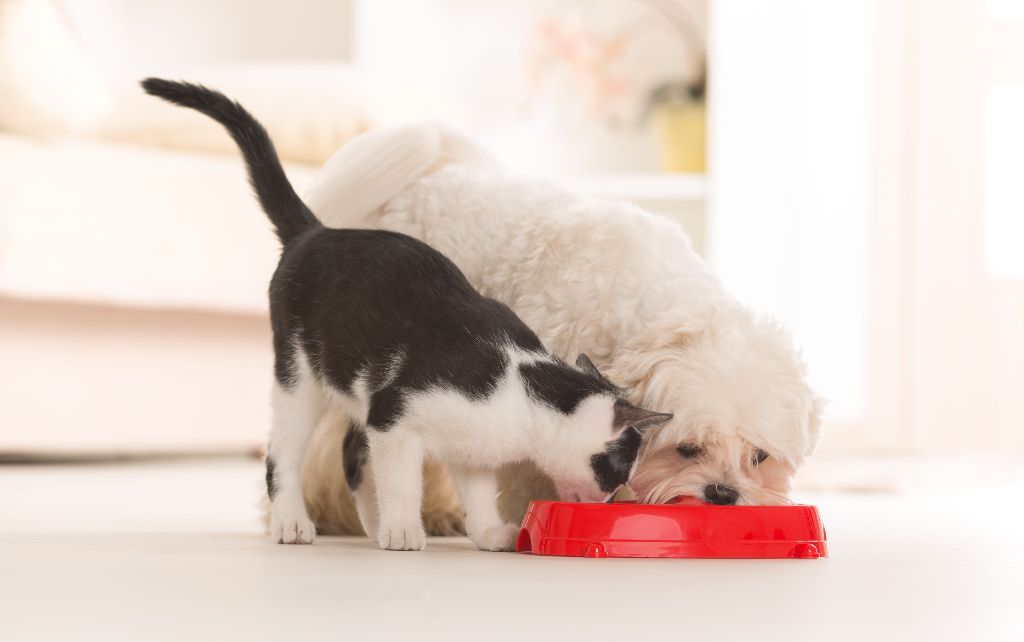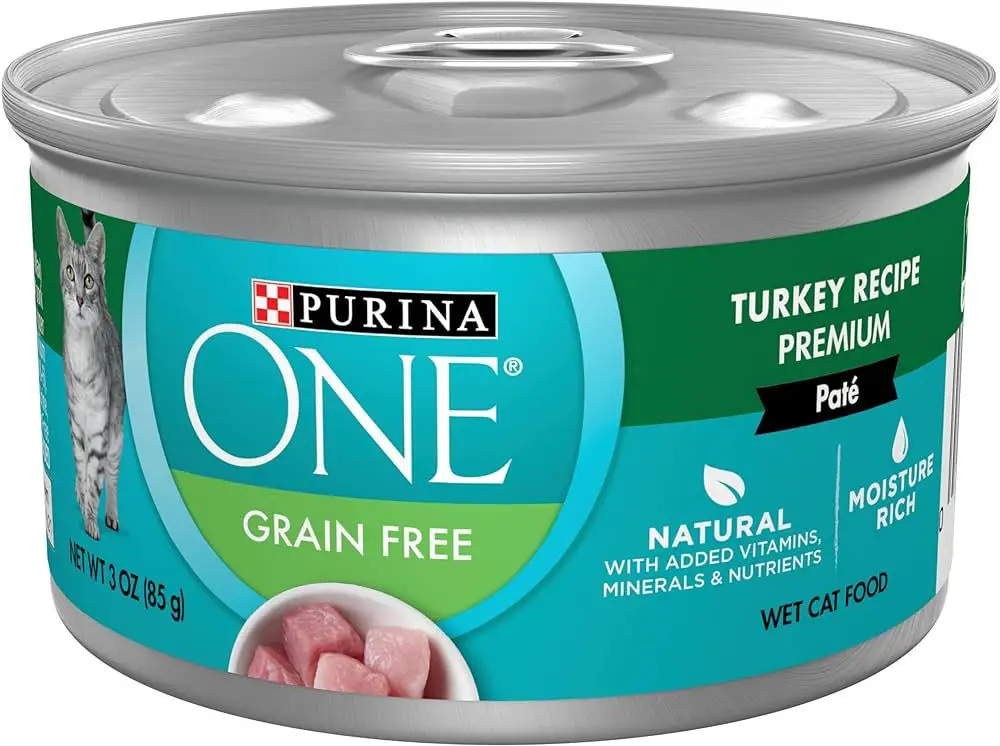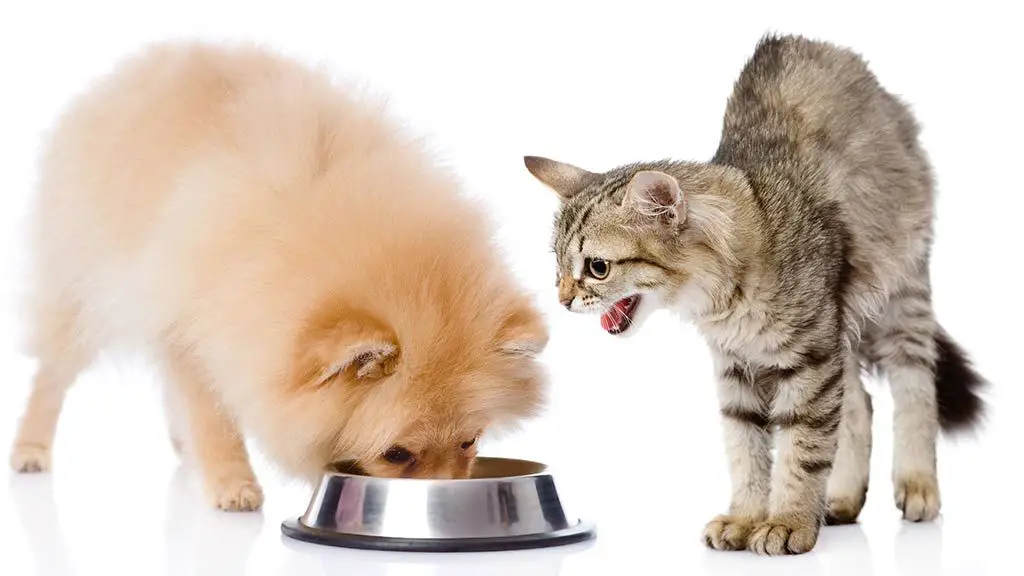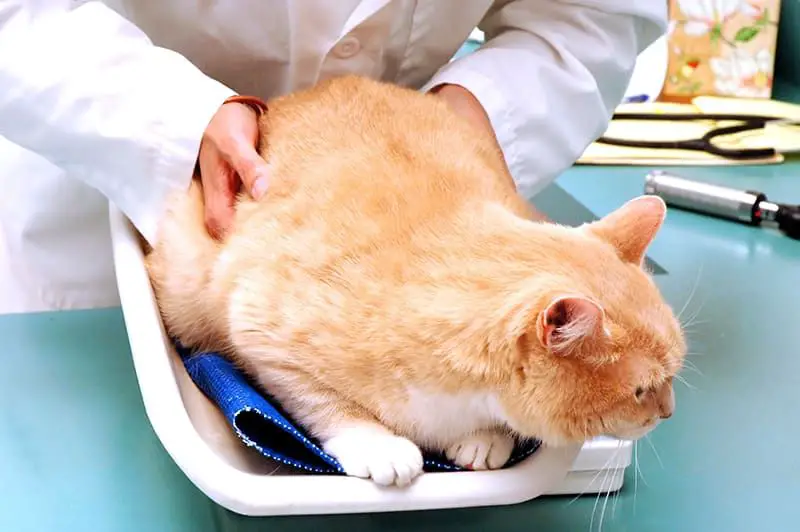Is It Safe for Cats to Eat Dog Food?
While an occasional nibble of dog food is generally safe for cats, regularly feeding cat dog food in place of cat food can pose some risks. There are key nutritional differences between formulations created for cats versus dogs that make dog food unsuitable as a steady diet for felines.
Dog foods typically have fewer proteins and more carbohydrates. They may also have lower levels of certain key nutrients like taurine, arachidonic acid, vitamin A, and niacin that cats require in their food (1). Feeding a cat dog food long-term can lead to malnutrition over time if their unique nutritional needs are not met.

Consuming dog food can also lead to weight gain in cats since dog foods often have more calories from fats and carbs. Obesity can then result in issues like diabetes, heart disease, and arthritis.
There are also concerns around the higher mineral content in dog foods. The increased minerals like magnesium and protein can put extra strain on a cat’s kidneys over time and potentially cause kidney disease.
While an occasional nibble likely won’t harm them, it’s generally not recommended to regularly feed cats dog food instead of cat food due to the nutritional imbalances. Checking with your vet is advised if your cat has eaten dog food regularly.
Nutritional Differences Between Cat and Dog Foods
Cats and dogs have very different nutritional needs, so their foods are formulated quite differently. According to Paw CBD, cat food is high-protein and rich in meat, which often appeals to dogs, but dogs should avoid cat food because it lacks proper nutritional balance for them.
One major difference is protein content. As obligate carnivores, cats need a diet high in quality protein from meat sources. Cat foods have a minimum crude protein content of 26% whereas dog foods only need a minimum of 18% (Paw CBD). The protein in cat food also comes primarily from animal sources whereas dog food contains more plant-based proteins.

Cat foods are also higher in fat, with a 9% fat minimum versus 5% in dog food (Meow Mix). Cats have a higher calorie requirement than dogs, so the additional fat provides concentrated energy. Fat also supplies essential fatty acids to help keep cats’ skin and coats healthy.
Fiber is another key difference. Cats do not derive much nutrition from carbohydrates and fiber, so cat foods are typically very low in carbs and fiber. Dogs, however, can utilize carbs and fiber more efficiently, so dog foods contain more grains and veggies (Avoderm Natural).
Certain amino acids like taurine and arginine are essential for cats but not dogs. Taurine supports eye and heart health. Arginine helps maintain cats’ urinary tract health. Cat foods are supplemented with higher levels of these key amino acids (Paw CBD).
Overall, dog food is not optimized to meet cats’ high protein requirements or dietary needs as obligate carnivores. Feeding a cat dog food can lead to malnutrition over time if their unique nutritional requirements are not met through proper cat food or supplementation.
Health Risks of Feeding Cat Dog Food
Dog food can put your cat’s health at risk in several ways since felines have different nutritional needs than canines. Some key risks of a cat eating dog food regularly include:
Risk of obesity – Dog food tends to have higher fat and calorie content to meet the energy needs of dogs. The Association of American Feed Control Officials requires adult dog food to have a minimum fat content of 5%, while cat food only needs a minimum of 2% fat. The higher fat in dog food can quickly lead to weight gain and obesity in cats.
Risk of heart disease – Dog food tends to have more grains and carbohydrates than cat food. While dogs can tolerate carbs well, cats have a low tolerance for carbohydrates. Eating carb-heavy dog food long-term can potentially lead to feline diabetes or heart disease.
Risk of eye and coat problems – Cats require more protein and taurine in their diet than dogs do. Lack of taurine can cause vision issues and retinal degeneration in cats. It may also lead to poor coat quality. Most dog food does not contain optimal levels of these nutrients for feline health.
Exceptions and Short-Term Use
While cats should not eat dog food long-term, there are some exceptions where it may be acceptable for a short period. According to Purina, the occasional piece of kibble stolen from the dog’s bowl is not a major concern (Purina). However, intentionally feeding a cat dog food regularly can lead to nutritional deficiencies.

In an emergency situation where you run out of cat food, it may be necessary to feed your cat dog food for a couple of days until you can buy more cat food. Some dog foods that contain a high percentage of protein from meat sources and are free of fillers may be less likely to cause issues. Look for dog foods with chicken, beef, lamb, or fish as the first ingredients. Avoid dog foods with corn, wheat, soy, and by-products.
Additionally, senior cats who have trouble chewing may be able to eat dry dog food easier than dry cat food since the kibble is larger. But this should be discussed with your veterinarian first.
Signs Your Cat Isn’t Tolerating Dog Food Well
If your cat has been eating dog food, even for a short period, watch closely for any concerning signs that the diet change is not agreeing with its body. Some key things to look out for include:
Weight Changes: Cats eating dog food may gain or lose weight. Weight gain can occur because dog foods have more carbohydrates. Weight loss may happen if the cat is refusing to eat the dog food or is having digestive issues preventing proper nutrient absorption.
Dull Coat: Dog foods lack certain nutrients cats need for a healthy, shiny coat. You may notice your cat’s fur becoming more dull and brittle on a dog food diet.
Energy Level Differences: Lack of key nutrients cats require may lead to changes in energy, such as appearing more sluggish. On the other hand, some cats get hyperactive on dog food due to the excess carbs.
Digestive Upset: Symptoms like vomiting, diarrhea, constipation, and excess gas can occur after eating dog food. The ingredients and composition aren’t optimized for feline digestion.
Any noticeable changes in weight, coat health, energy, or digestion after eating dog food could signal your cat is not tolerating it well. Contact your veterinarian if these symptoms persist or worsen. Switching back to a high-quality cat food should help resolve issues.
Best Practices Going Forward
While it’s not recommended to regularly feed your cat dog food, there may be certain situations where you need to transition their diet. If so, it’s best to do this slowly and gradually mix in more dog food over time. Cats do not handle sudden changes in diet very well. Mix a small amount of dog food in with their regular cat food, starting with a 75/25 ratio of cat to dog food. Over the course of a week or two, slowly adjust this to 50/50. Monitor your cat closely during this transition period for signs of digestive upset or refusal to eat.

In general, it’s best to stick to high-quality cat food formulated specifically for feline nutritional requirements. Cat foods contain more protein and fat, as well as essential amino acids like taurine that dogs produce on their own. They also have the ideal calcium to phosphorus ratio for cats. Feeding only dog food long-term could lead to malnutrition and health issues in cats over time.
If your cat needs more of a certain vitamin or mineral, you can supplement their diet with cat-safe chews and treats to boost their levels. For example, treats containing fish oil or vitamin E. Just check with your vet first about what supplements may be beneficial. With the proper cat food diet and targeted supplementation as needed, you can ensure your cat’s unique nutritional needs are being met.
When to Call the Vet
If your cat begins exhibiting concerning symptoms after eating dog food, it’s important to contact your veterinarian. Significant vomiting, diarrhea, lethargy, or other signs of illness warrant a call to the vet. They can examine your cat and provide supportive care to help resolve any issues.
It’s also a good idea to touch base with your vet for guidance on transitioning your cat from dog food back to cat food safely. Sudden changes in diet can cause digestive upset, so your vet may recommend mixing the foods together gradually over 5-7 days. They can advise you on proper portions and timing to switch foods in a way that is gentle on your cat’s stomach.
In general, contact your vet promptly if you notice any of the following after your cat eats dog food:
- Repeated vomiting
- Diarrhea lasting more than 24 hours
- Extreme lethargy or weakness
- Decreased or absent appetite
- Signs of abdominal pain like hunching up
Your vet can rule out serious issues and get your cat back on track. With proper medical care and gradual transitioning, your cat can recover fully from short term dog food ingestion. Stay in close contact with your vet for optimal health.
Healthy Homemade Food Options
If you want to make your own homemade cat food, it’s important to consult with your veterinarian first to ensure the meal plan is nutritionally balanced. Cats have specific dietary needs, so homemade food requires careful planning and preparation.
Some healthy homemade cat food recipes focus on a protein source like chicken or fish, a carbohydrate like rice or quinoa, and veggies for added nutrition. According to this vet-approved recipe, you can make a chicken and rice recipe using boneless chicken breast, cooked rice, chicken broth, carrots, and supplements like taurine.
Another recipe option from Cats.com utilizes chicken thighs with the bone for added minerals. This can be combined with liver and supplements. Stews with fish like salmon or tuna are also possible.
When making any homemade food, proper storage and food handling is critical. The food should be kept refrigerated and consumed within 2-3 days. All ingredients should be human-grade and meats should be cooked thoroughly. Portion sizes will need to be adjusted for your cat’s weight and activity level.
While homemade food can be a healthy option, it’s essential to consult your vet first. They can ensure the recipes and portions will provide complete, balanced nutrition tailored for your individual cat’s needs.
FAQs
Here are answers to some frequently asked questions about cats eating dog food:
Can cats eat dog food long term?
No, cats should not eat dog food as a regular, long-term diet. According to Purina, dog food does not contain the right balance of nutrients, vitamins and minerals that cats need for their health over an extended period of time. Dog food is higher in protein and fat, and lower in fiber compared to cat food. Eating dog food long-term can potentially lead to obesity, diabetes, urinary tract diseases and other problems in cats.
What happens if a cat eats dog food?
If a cat eats a small amount of dog food on occasion, such as stealing a bite from the dog’s bowl, there is minimal risk of harm according to PetMD. However, if a cat eats primarily dog food for an extended period of time, potential risks include nutritional deficiencies, weight gain, digestive issues, and urinary crystal formation. Look for signs like increased thirst, changes in litter box habits, vomiting, or lethargy.
Is dog food better than cat food?
No, dog food is not better for cats than cat food. As explained by Dutch, cat food is specially formulated to meet cats’ unique nutritional needs. Dog food contains too much protein and fat, and not enough essential vitamins and amino acids that cats require. While a cat may seem to like the taste of dog food, feeding a cat primarily dog food long-term can lead to major health issues.
The Takeaway on Cats Eating Dog Food
In summary, while not immediately toxic, dog food should not make up a regular part of a cat’s diet. Cats are obligate carnivores with specific nutritional needs, including higher protein content and taurine. Dog food is lower in protein and lacks adequate taurine to meet a cat’s requirements.
Feeding a cat dog food long-term can potentially lead to taurine deficiency and heart disease. Other risks include nutritional deficiencies, weight gain, and gastrointestinal issues. At most, dog food should only be fed to a cat for a couple days in an emergency situation.
For optimal feline health and nutrition, cats should eat a high protein, meat-based cat food formulated with taurine and all the essential vitamins and minerals cats need. Feeding dog food occasionally as a treat or in a pinch is unlikely to harm a cat, but it should not become a routine part of their diet. Consult your veterinarian if you have any concerns about your cat’s nutritional needs.

